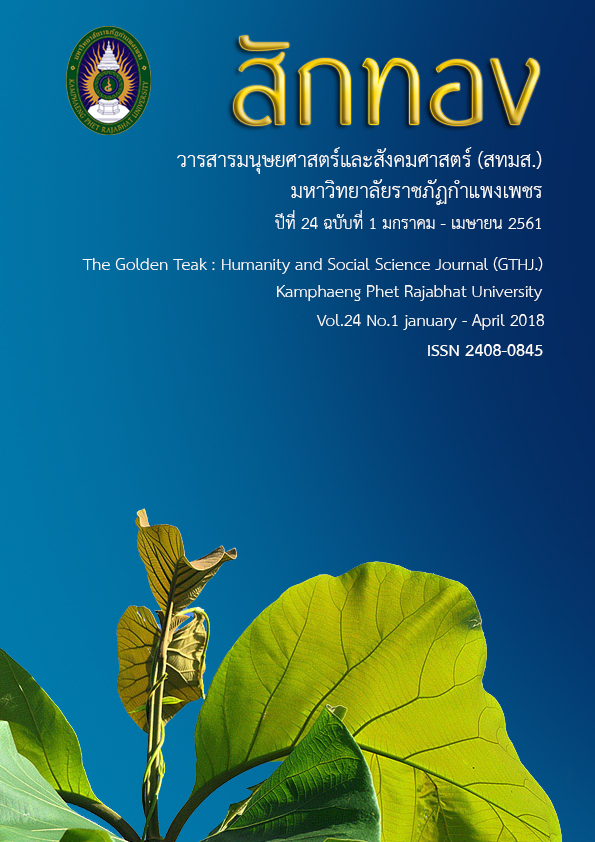Development Competency Indicators of Academic Leadership of School Administrators on the 21st Century Student Learning Management in Schools under the Bangkok Metropolitan
Main Article Content
Abstract
The objectives of this research were to: 1. develop competency indicators of academic leadership of school administrators on the 21st century student learning management in schools under the Bangkok Metropolitan; 2. verify those competency indicators with empirical data; and 3. propose academic leadership competency evaluation guidelines of school administrators on the learning management. A sample of 280 was randomly selected from administrators of those schools. An interview form, a questionnaire and an evaluation form were used for data collection. The data was analyzed in terms of percentage, mean, standard deviation, and confirmatory factors analyses. The findings revealed as follows. 1) There were three competency aspects and 14 indicators of school administrator academic leadership for the mentioned learning management. 2) Testing of linear structural relationship showed the model was valid and consistent with the empirical data. 3) As for the guidelines, based on the competency indicators, the developed indicators for evaluation of academic leadership competency of school administrators on the learning management were considered to be suitable at the high level.
Article Details
บทความที่ได้รับการตีพิมพ์เป็นลิขสิทธิ์ของวารสาร สักทอง : วารสารมนุษยศาสตร์และสังคมศาสตร์ สถาบันวิจัยและพัฒนา มหาวิทยาลับราชภัฏกำแพงเพชร
ข้อคิดเห็นใดๆ ที่ปรากฎในวารสารเป็นวรรณกรรมของผู้เขียนโดยเฉพาะ ซึ่งมหาวิทยาลัยราชภัฏกำแพงเพชรและบรรณาธิการไม่จำเป็นต้องเห็นด้วย
References
Bangkok Bureau of Education, the. (2015) The 2015 Operational Plan. [Online]. Available :
https://drive.google.com/file/d/0B-ixCfQFqmACN2lIQ3NaYVZLbWs/view.
[2016, January 31].
Beauchamp, R.H. (1975). Education in Japan: A Source Book. New York : Garland.
Chueachan, C. (2005). Ethics : Theory of Ethics for Educational Administrators. Bangkok : Odeon Store.
Dejakupt, P & Yindeesuk, P. (2015). Learning Management in the 21st Century. (2 nd ed.). Bangkok : Chulalongkorn University Press.
Hair, J.F., et al. (2010). Multivariate data analysis : A global perspective. Upper Saddle River, New Jersey : Pearson.
Khiewsri, P. (2017). Quality Assurance. [Online]. Available : http://www.seameo.org/vl/articles/assurance.htm. [2017, May 31].
Kitpreedaborisoot, B. (1999). Techniques of Data Research Collection Tools Construction. (4 th ed.). Bangkok : B&B Publishing.
Kongtiang, S. (1997). Principles of Educational Administration. (2 nd ed.). Bangkok : Ramkhamhaeng University.
Pitipontapin, S. (2015). Sciences and Social Learning Management in the 21st Century. Bangkok : Neva Education.
Sinthurawech, S. (1997). Educational Quality Development. Bangkok : Thai Wattana Panich.
Sriha-amphai, P. (2000). Basic Religious and Ethical Education. Bangkok : Chulalongkorn
Srisa-ard, B. (2002). Basic Research. (7 th ed.). Bangkok : Suwiriyasarn.
Srithong, C. (2008). Existing and Expected Roles of school Administrators and on Development of an Internal Assurance System as Perceived by Personnel of the Karnchanaburi Basic Educational Kanchanaburi Educational Service Area Office. Masters of Education, Educational Administration Kanchanaburi Rajabhat University.
Suksawat, S. (2009). Ethics and Moral Development of Students in the Nonthaburi Girl School. Master of Education Independent Study Silapakorn University.
Taba. (1962). Curriculum Development : Theory and Practice. New York : Harcourt, Brace & World.
Thirapo, P. (2000). Curriculum and Management of Secondary Education. Phetchaburi : Faculty of Education Rajabhat Institute Phetchaburi University.
Office of Secretary General, The. (2013). The 2013 Annual Report. Bangkok : Century Co., Ltd.


